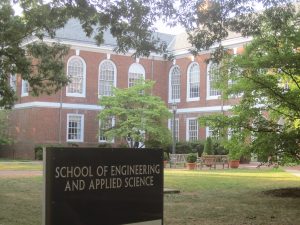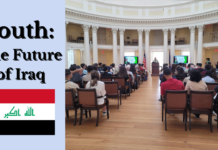
The University of Virginia’s School of Engineering and Applied Science recently received a grant of $27.5 million to improve computer systems everywhere.
The newly founded Center for Research in Intelligent Storage and Processing in Memory (CRISP) will work with researchers from eight different universities to dispose of old memory processing systems that prevent technological advances. CRISP seeks to master larger datasets and cutting edge software that these older systems simply cannot handle.

WUVA News spoke to Kevin Skadron, chair of the UVa Department of Computer Science, and now the Director of CRISP.
The problem CRISP aims to beat out dates back to 1945 when John von Neumann, one of the first computer scientists, developed a method for computer programming. Skadron explained how Neuman’s discoveries quickly became outdated.
“The performance bottleneck we are tackling, the ‘memory wall,’ [became] a problem in the late 1980s and early 1990s, as technology changed and processors became much faster than memory,” the CRISP Director started. “There has been…some progress, but the problem is still getting worse as processors continue to get faster and memory technology cannot keep up. The rapid growth in datasets [aka big data] just exacerbates the problem.”

So why did UVa decide to take on the daunting task of making computers smarter?
“New technologies are emerging that are promising, such as 3D stacking of chips. The UVa team has expertise in the relevant areas and felt that we were well positioned to lead a center on this topic,” Skadron said.

CRISP is part of a $200 million program, JUMP, by the North Carolina-based Semiconductor Research Corporation (SRC). The SRC brings government agencies, university programs, and industry tech leaders together to solve issues like this one.
Although centered at UVa, CRISP is not a “brick and mortar” center according to Skadron. UVa students however, will get to play a role in this exciting endeavor.
“It’s a virtual center, with 20 faculty across 8 universities, led by UVa. The grant will fund about 100 PhD students altogether, including 12 [from the University of Virginia],” he explained.
The project will also provide research opportunities for a similar number of undergraduate students at each of the participating universities.
CRISP is funded for 5 years and over that time, hardware and software systems will be tested together to ultimately eliminate disparities between memory and processing functions.
“We can achieve some important breakthroughs in that timeframe,” Skadron stated.
By the end of this time, the CRISP Director plans to publish papers, disseminate software and data, and build test chips.
“Ultimately, the impact will be on industry, as they hopefully adopt our techniques – and hire our students!”

















